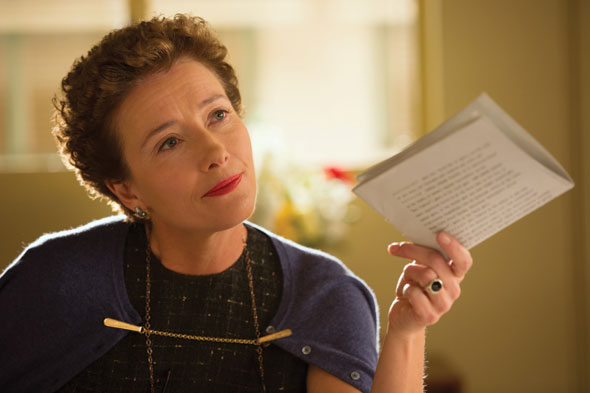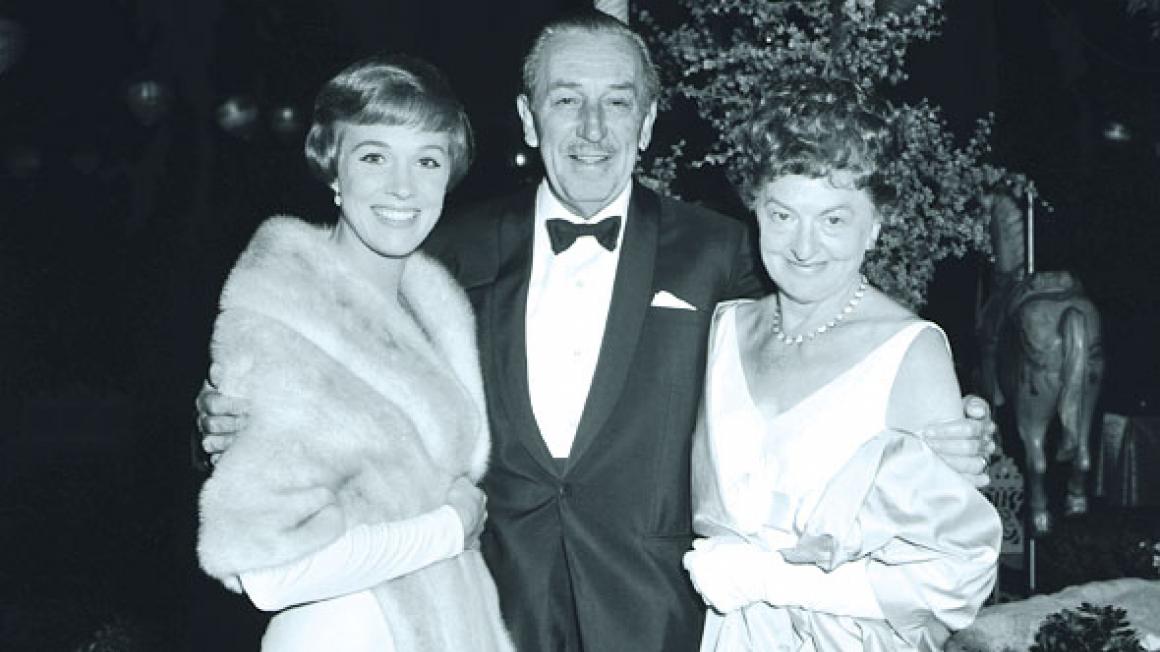Why making Mary Poppins was no jolly holiday
In an unprecedented and unsurpassed record for Walt Disney Studios, the film also received a total of 13 Academy Award nominations, with Julie Andrews taking home the Best Actress gong. The film’s appeal still endures, yet it is interesting to discover that as today’s youngsters continue to learn the words to Supercalifragilisticexpialidocious, the story very nearly didn’t make it to the screen at all.
In a movie-making full circle, the new Disney film, Saving Mr Banks, starring Tom Hanks and Emma Thompson, depicts the relationship between Walt Disney and the author of Mary Poppins, PL Travers. Pamela Lyndon Travers penned eight Mary Poppins novels between 1934 and 1988, all of which centred around the strict yet magical nanny and her relationship with the Banks family.
 Walt Disney (Tom Hanks) and PL Travers (Emma Thompson) battle it out in Saving Mr Banks
Walt Disney (Tom Hanks) and PL Travers (Emma Thompson) battle it out in Saving Mr BanksWalt Disney, as ever the shrewd and successful film-maker, spent nearly two decades trying to persuade Travers to let him buy the rights to the character. Travers, by all accounts a brilliant yet diffi cult figure herself, finally relented on the condition that she had strict script approval.
The film receives the usual Disney gloss, conveying the interactions between Disney and Travers as quarrelsome, yet warm. The reality, however, was not quite so syrupy.
Despite working closely on the Mary Poppins film, Travers had many objections with the finished product. She did not care for the musical numbers (composed by the eminent Sherman brothers), resented the softening of the Poppins character, and abhorred the animation.

In fact, rumour has it that she approached Walt Disney at the premiere of the film and demanded that he remove the famous animation sequence, to which he replied, ‘Pamela, the ship has sailed.’ Enraged at what she considered to be unjust treatment, she refused to allow Disney Studios to adapt any more of her stories, despite repeated appeals.
She may have created the quintessential British nanny, but few know that Travers was actually from Australia. She was born Helen Lyndon Goff in Queensland in 1899, the daughter of a failed bank manager named Travers Robert Goff and his wife, Margaret.
Although her father died from influenza when she was only seven years old, he had a huge infl uence on her life. An Irishman with a penchant for alcohol and storytelling, his mythical tales stimulated his daughter’s writing.
 Thompson sported a perm for her role as PL Travers
Thompson sported a perm for her role as PL Travers‘When drinking, Robert typically entertained (or bored) guests with well-known Irish poetry and folk talks,’ writes Paul Brody in his book, The Real Life Of Mary Poppins: The Life And Times of PL Travers. ‘This curious turn of mind likely had a formative role in the imagination of the young Helen Lyndon Goff.’
It is widely recognised that Goff was the chief inspiration behind the character of Mr Banks in the Mary Poppins stories, too: not only for being a bank worker, but for being a much-loved but ultimately absent father. In the grand tradition of Disney happy endings, Mr Banks shrugs off his starchiness by the end of Mary Poppins and shows his children the love they so crave. Reality was not quite so kind to Travers. With her father no longer around, she could only imagine the ‘practically perfect in every way’ Poppins as an antidote to her less-than-perfect family life.
 With co-star Tom Hanks at the film's London premiere
With co-star Tom Hanks at the film's London premiereEmma Thompson spent many months preparing for the role, describing Travers as a woman of ‘eye-watering complexity and contradiction’. As well as a novelist, Travers was also a journalist and actress. She spent her early adult years travelling with a Shakespearean touring company in Australia and New Zealand, before moving to England in 1924. There she dedicated herself to her writing, socialising with other celebrated poets and writers of the day, including George William Russell and WB Yeats.
Mary Poppins may be the epitome of decorum, but PL Travers’s behaviour was significantly more colourful: she never married but embarked upon relationships with both men and women, and adopted a son, Camillus Hone, after being guided by her astrologer.
Despite her success, she was never able to shake the feeling of loss sustained from her childhood. Having quickly become an expert on this intriguing lady, Thompson sums up her nature perfectly: ‘I think she spent her whole life in a state of fundamental inconsolability, and hence got a lot done.’
Travers passed away in London in 1996. She never allowed another Mary Poppins film to be made, but no one can deny that the 1964 version has stood the test of time. Now with Saving Mr Banks bringing Travers’s own story to the mainstream, this complex lady and her life’s work is set to captivate audiences once more.
Saving Mr Banks is on general release in cinemas.
Pictures: Disney Enterprises, Ltd


